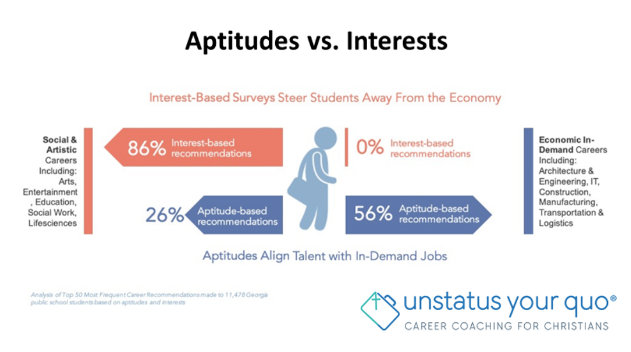There is a recent study of the 50 most frequent career recommendations made to 11,478 Georgia public school students based on interest-based versus aptitude-based assessments. The results may revolutionize how career assessments are done leading to tapping the full potential of our students and workers.
If your child is a female or a minority student, the most common and older assessment science (interest-based) could lead your child to recommendations for college major or career that leads to a life of frustration and unfulfillment. Your child or spouse deserves better. It is imperative for you to make sure the career assessment is aptitude-based, not interest-based or self-reported skills based.
To make matters worse, the statistics of bias in recommending careers are staggering. Your child’s or spouse’s career fulfillment could depend upon it. You can avoid watching your child struggle in college and in her career. Imagine waking up every morning excited about your work life. Now there is a better way to find that right career.
You Will Not Believe The Basis For The Older Science
The older and prevalent career assessment science is informally called “interest-based, self-reported skills.” The newer science is informally called “aptitude-based.” In other words, the older science’s career recommendations are based upon the interests and the self-view of a 17-year-old.
There are 1,110 occupations in the Department of Labor’s O*NET Database. How could we ever expect high school students to know comprehensively the careers of interest to them? Unfortunately, the parents can also make the situation worse with advice based on their lack of career option awareness.
How many 17-year-olds have an accurate assessment of their level in their skills, some of which are not even tested at school? How many 17-year-olds know comprehensively the gifts God has given them? I did not. Did you?
Fortunately, there is a better way. The newer science relies far less on the child’s self-awareness and perceptions. The aptitude-based science reveals the child’s gifts or aptitudes and tests for their strengths. This objectivity is immeasurably valuable and essential to matching a child or adult with the careers most in need of the aptitudes possessed by the child or adult. There are many more differences and elements to this developing story but let us get to the bottom line for you.

Graphics From The Georgia Student Study
The first graphic reveals how often the top 50 career recommendations lead individuals to the social and artistic careers: including arts, entertainment, education, social work and life sciences and the economic in-demand careers: including architecture, engineering, IT, construction, manufacturing, transportation and logistics.
For the interest-based, older science, 86% of the top 50 recommendations were for the social and artistic careers and 0% for the economic in-demand careers. For the aptitude-based or more modern science assessments, 26% of the career recommendations went for the social and artistic careers and 56% for the economic in-demand careers. The study’s conclusion was “aptitudes align talent with the in-demand jobs.”








